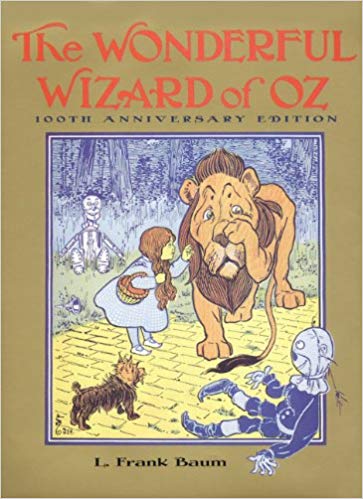
“No matter how dreary and gray our homes are, we people of flesh and blood would rather live there than in any other country, be it ever so beautiful. There is no place like home.
The Scarecrow sighed.
“Of course I cannot understand it,” he said. “If your heads were stuffed with straw, like mine, you would probably all live in the beautiful places, and then Kansas would have no people at all. It is fortunate for Kansas that you have brains.”
L. Frank Baum, The Wonderful Wizard of Oz
I recently finished rereading The Wonderful Wizard of Oz by L. Frank Baum. This was a facsimile of the first edition with colored images throughout and illustrations by W. W. Denslow. I adore this book. It’s the story that first introduced the world to Oz, although the fairy country goes through changes throughout it’s later history of books and movies and more, of course. But it is not difficult to see why this book became an instant classic and a massive bestseller when it was published in 1900. It may be a fantasy story like many others in some ways, but it’s also distinctly new and different. Even today, it stands out, which is rather remarkable.

There were a bunch of things about Oz that were new and different, not only in stories for children or in fantasies, but in general. Baum created a fantasy world that, unlike any before it that I know of (certainly any that were famous), was distinctly American. His fantasy world isn’t filled with knights and kings and princesses. It doesn’t have fairies and elves clearly based on old European fairy lore. It has vast open spaces to travel across – not just woods, but also prairies and stretches of farmlands. The power in Oz is not only not held by a monarch, but not even by the popularly chosen leader of dubious qualifications. The real power in Oz, both good and evil, resides in the hands of women – witches and a little girl whose unintended charisma makes her exactly the hero everyone needs.
“I shall take the heart,” returned the Tin Woodman; “for brains do not make one happy, and happiness is the best thing in the world.”
L. Frank Baum, The Wonderful Wizard of Oz
Even the four requests that anchor the story – the Scarecrow’s brains, the Tin Woodman’s heart, the Lion’s courage, and Dorothy’s trip home are unusual for fantasy stories. They aren’t trying to change the world or even meaningfully impact it. They are trying to get their own small, personal wishes and saving the world just sort of happens along the way.

The Wizard of Oz himself is a fascinating character. He is less a commentary on politicians than simply a caricature of the kind of showman that peppered the American west. He’s not only a circus advertiser, but also the kind of salesman that went around doing shows to get frontier towns to buy patent medicines. But for all that, he’s not a bad guy at all. On the contrary – he’s somewhat dismayed at having to be such a charlatan. Even after he says he has no magic or power to grant their wishes, the four companions insist that he do so anyway. How else should he act if people ask things he can’t possibly do, even after he explains that to them?
“Can’t you give me brains?” asked the Scarecrow.
“You don’t need them. You are learning something every day. A baby has brains, but it doesn’t know much. Experience is the only thing that brings knowledge, and the longer you are on earth the more experience you are sure to get.”
“That may all be true,” said the Scarecrow, ” but I shall be very unhappy unless you give me brains.”
L. Frank Baum, The Wonderful Wizard of Oz

But the world is not without real powers, they simply aren’t held by the Wizard. The actual power in Oz resides with four women, each seemingly the caretaker of one of the four cardinal directions. They possess real magic and we see or hear about each using it for various purposes. Even the Witch of the East, who is dead when we first encounter her name, is described as having enchanted the Tin Woodman’s axe to chop him up. And Dorothy may not have any magical powers herself, but she certainly possesses the power to charm everyone she meets and find help whenever she needs it. She defeats both of the wicked witches unintentionally and saves Oz from their evil, which gets her hailed as a hero, even as the bewildered girl asks simply for a trip home.
There’s so much to adore about this book and I really do love rereading it periodically. It’s amazing how simple the story is, but how complex the book itself is at the same time. And while I love the movie and other adaptations of it, I find it a little sad that they have so overshadowed the original book that this brilliance gets a little lost sometimes. This book did so much to change how we tell stories – books for children, fantasy stories, and even more generally. It was unique then and still stands as fairly unique now!
[…] Final Thoughts: The Wonderful Wizard of Oz […]
LikeLike
[…] Final Thoughts: The Wonderful Wizard of Oz […]
LikeLike
[…] Final Thoughts: The Wonderful Wizard of Oz […]
LikeLike